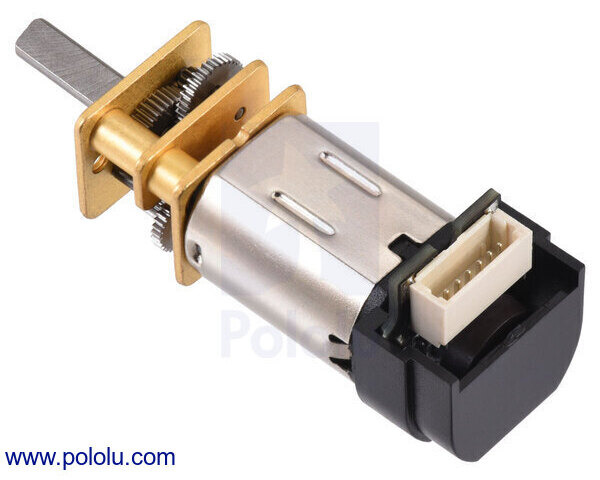Pololu Metal DC Gearmotors » Micro Metal Gearmotors » 6V High-Power Carbon Brush (HPCB) Micro Metal Gearmotors »
50:1 Micro Metal Gearmotor HPCB 6V with 12 CPR Encoder, Side Connector
This is a miniature brushed DC metal gearmotor with a gearbox cross section of 10×12 mm and a 9 mm long, 3 mm diameter D-shaped gearbox output shaft. Cables sold separately.
| motor/brush type | gearbox | encoder | |
|---|---|---|---|
| HPCB 6V: high-power 6V with carbon brushes | 51.45:1 with brass plates | 12 CPR incremental quadrature with side connector | |
| voltage | no-load performance | stall extrapolation* |
|---|---|---|
| 6 V | 650 RPM, 150 mA | 0.74 kg⋅cm (10 oz⋅in), 1.5 A |
| * Note: Stall torque and stall current specifications are theoretical values; stalls could damage the motor or gearbox. | ||
Alternatives available with variations in these parameter(s): gear ratio motor type encoder Select variant…
 Compare all products in 6V High-Power Carbon Brush (HPCB) Micro Metal Gearmotors.
Compare all products in 6V High-Power Carbon Brush (HPCB) Micro Metal Gearmotors.
| Description | Specs (17) | Pictures (26) | Resources (3) | FAQs (2) | On the blog (0) | Distributors (2) |
|---|
Dimensions
| Size: | 10 × 12 × 32 mm1 |
|---|---|
| Weight: | 11 g |
| Shaft diameter: | 3 mm2 |
General specifications
| Gear ratio: | 51.45:1 |
|---|---|
| No-load speed @ 6V: | 650 rpm3 |
| No-load current @ 6V: | 0.15 A4 |
| Stall current @ 6V: | 1.5 A |
| Stall torque @ 6V: | 0.74 kg·cm |
| Max output power @ 6V: | 1.2 W |
| Encoder: | 12 CPR encoder with side connector |
| Long-life carbon brushes?: | Y |
| Motor type: | 1.5A stall @ 6V (HPCB 6V - carbon brush) |
Performance at maximum efficiency
| Max efficiency @ 6V: | 32 % |
|---|---|
| Speed at max efficiency: | 490 rpm |
| Torque at max efficiency: | 0.16 kg·cm |
| Current at max efficiency: | 0.42 A |
| Output power at max efficiency: | 0.80 W |
Notes:
- 1
- Output shaft adds 10 mm to the 32 mm length, and the encoder extends past the 10 × 12 gearbox cross section on three of the four sides. See dimension diagram for details.
- 2
- D shaft.
- 3
- Typical; ±20%.
- 4
- Typical, ±50%; no-load current depends on internal friction, which is affected by many factors, including ambient temperature and duration of motor operation.




































